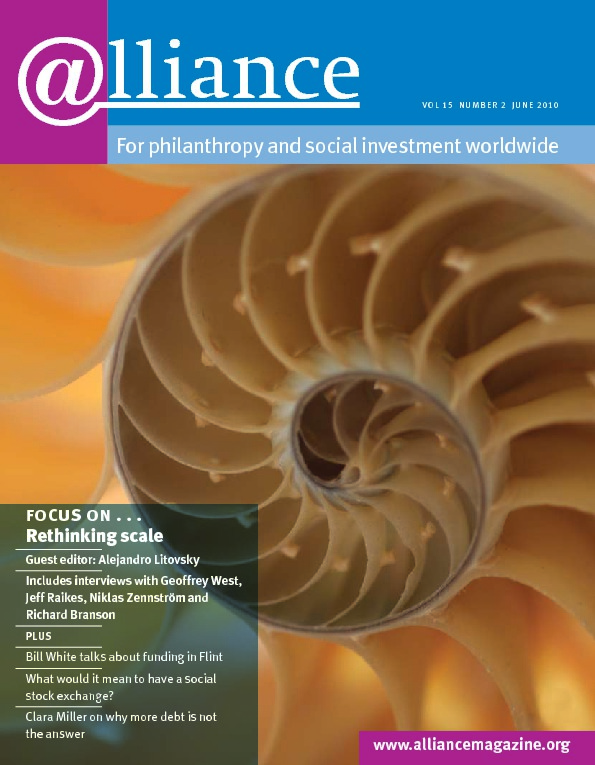Michael Edwards strongly criticizes philanthrocapitalism and philanthrocapitalists. In his critique, he explores the myths and realities about this controversial, market-based approach. But in the end he raises as many questions as he attempts to answer. The very title of the book raises a question: ‘Who can save the world alone?’
Edwards makes good arguments about the shortfalls of venture philanthropy, social investment and social entrepreneurs. He writes: ‘Claims that business will save the world are a dangerous case of hubris.’ Despite the fact that Edwards calls for dialogue and admits that there is no one way forward, I would argue that his bias towards what he calls ‘citizen philanthropy’ is misguided hubris in relation to the power of civil society.
Both the philanthrocapitalist and the citizen philanthropist have very strong – almost religious – belief systems. The differences between the two are primarily ideological – similar to the differences between economic liberals and social democrats. Why do we in the philanthropic sector behave as ideological virgins? Often our differences are simply ideological differences, but we package them as methodological debates. Both the philanthrocapitalist and the citizen philanthropist believe they can save – or change – the world. This is over-promising. They are both guilty of over-simplifying their power and missionary-like in their zeal to exercise it.
Both players should exchange such pretensions for more ambition. Both business and civil society could do with a dose of modesty in relation to their ability to effect social change.
Edwards writes: ‘Social change requires an orchestra of instruments with a democratic conductor, not a single, dominant brass section constantly playing its own monotonous tune.’ In this quote he plays with nuances. But throughout most of the book he implies that civil society actors are by definition democratic, compared with the bossy know-it-alls from the big bad world of business. I would argue that civil society leaders and organizations are not automatically custodians of democracy either.
Just as philanthrocapitalists are blinded by idealism about the power of the corporate sector, so is Edwards blinded by idealism about the potential of civil society. He does not believe in the invisible hand of the market, but he certainly believes in the invisible hand of civil society.
The tone throughout his book is that civil society is inherently representative and therefore good, but because of its guiding principles, business is inherently bad. Civil society is not always ‘good’. Civil society is not always representative. Consider the anti-government, anti-taxation Tea Partiers in the United States.
Edwards writes: ‘Social transformation is not a job to be left to market forces or to the whims of billionaires.’ At the same time, he admits that civil society does not bring social transformation because solutions to problems such as poverty and conflict require government and business to put them into practice.
In his arguments, his touchstone is whether an action fights inequality. I would suggest that Edwards’ touchstone is the result of reductionist philanthropy. He argues that philanthropy’s ‘job’ is to change the world or change the lives of individuals. Is philanthropy only about social transformation? What about funding art, culture and scientific research, for example?
However, I do agree with Edwards that the way forward is for business and civil society to continue along their separate paths, but that they should work together in complementary ways. Each sector has its comparative advantages.
Edwards argues that citizen philanthropy is part of a ‘real’ democracy, but that philanthrocapitalism is not. I believe that in democratic societies there is a need for a healthy tension between the free market and social engineering or social change.
Democracy implies many different approaches to philanthropy. There is not one magic tool in the toolbox. As Chet Tchozewski, president of Global Greengrants Fund, wrote about social systems in the last issue of Alliance: ‘If [social systems] become too dominated by one species or set of ideals, they become vulnerable.’
This is why I make the argument against Edwards’ call for a monopolistic approach. Instead, we need more diversity in the philanthropic landscape. So long live both philanthrocapitalism and citizen philanthropy!
Small Change: Why business won’t save the world
ISBN 9781605093772
Michael Edwards Berrett-Koehler US$16.95/£14.99 (paperback) US$11.87 (PDF)
To order/download
http://www.bkconnection.com (US)
http://www.mcgraw-hill.co.uk (Europe)
Luc Tayart de Borms is Managing Director of the King Baudouin Foundation. Email TAYART.L@Kbs-frb.be


Comments (0)